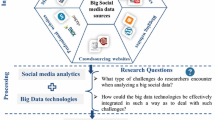Abstract
Where social media plays a huge role in people's lives as the primary communication tool nowadays, it is a huge data source for people's opinions. Hence, conducting analytics on social media data can help different organizations make decisions. For that, social media analytics is the primary focus of researchers nowadays. In this paper, we presented this survey that has a literature review for researchers in Netnography. The primary focus is on the topic of analyzing user opinions regarding different issues based on Netnography research methodology. The survey presented studies with their contribution, strengths and limitations along with some details for each study.
Access this chapter
Tax calculation will be finalised at checkout
Purchases are for personal use only
Similar content being viewed by others
References
AlDajani IM (2020) Internet communication technology (ICT) for reconciliation: applied phronesis netnography in internet research methodologies. Springer, New York. https://www.springer.com/gp/book/9783030412029
Alfayoumi B, Alshraideh M, Al-Sharaeh S, Leiner M, AlDajani IM (2021) Analyzing the sentiments of Jordanian students towards online education in the higher education institutions. Int J Adv Comput Sci Appl 12(11). https://doi.org/10.14569/IJACSA.2021.0121108
An W, Alarcón S (2021) From netnography to segmentation for the description of the rural tourism market based on tourist experiences in Spain. J Destin Mark Manag 19:100549
Bayen S, Carpentier C, Baran J, Cottencin O, Defebvre L, Moreau C, ... Messaadi N (2021) Parkinson’s disease: content analysis of patient online discussion forums. A prospective observational study using Netnography. Patient Educ Couns
Belk R, Kozinets RV, Dicks B, Mason B, Coffey A, Atkinson P, Kozinets RV (2015) Netnography: redefined (first 2 chapters). In: Formative research methods in social marketing: innovative methods to gain consumer insights, pp 7–52https://doi.org/10.1002/9781118290743.wbiedcs067
Belk R, Kozinetz R (2017) Videography and netnography. In: Formative research in social marketing. Springer, Singapore, pp 265–279
Coombes PH, Jones S (2020) Toward auto-netnography in consumer studies. Int J Mark Res 62(6):658–665
Deeva I (2019) Computational personality prediction based on digital footprint of a social media user. Proc Comput Sci 156:185–193
Drucker J (2013) Intro to digital humanities: introduction. UCLA center for digital humanities. Accessed 26 Dec 2016
Hajra V (2020) Big data, netnography and smart tourism
Kozinets RV (2010) Netnography: the marketer's secret weapon (NetBase White Paper)
Kozinets RV (2015) Netnography: redefined. Sage, London
Kozinets RV (2016) Amazonian forests and trees: Multiplicity and objectivity in studies of online consumer-generated ratings and reviews, a commentary on de Langhe, Fernbach, and Lichtenstein. J Consum Res 42(6):834–839
Langer R, Beckman SC (2005) Sensitive research topics: netnography revisited. 8(2):189–203
Maya-Jariego I, Martínez-Alba I, Alieva D (2021) “lenty of black money: netnography of illegal recreational underwater fishing in southern Spain. Mar Policy 126:104411
Moretti F (2005) Graphs, maps, trees: abstract models for a literary history. Verso
Paccagnella L (1997) Getting the seats of your pants dirty: strategies for ethnographic research on virtual communities. J Comput-Med Commun 3(1). https://doi.org/10.1111/j.1083-6101.1997.tb00065.x
Rheingold H (1993) The virtual community: homesteading on the electronic frontier. Addison-Wesley, Reading, MA
Reid B (1995) USENET readership report for March 1995
Shaw A (2020) Netnography and a summative content analysis approach to market research. J Emerg Trends Mark Manag 1(1):12–22
Spirits A (2021) Benefits of digital humanities|Duke digital humanities. https://digitalhumanities.duke.edu/benefits-digital-humanities. Accessed 27 Feb 2021
Tavakoli R, Mura P (2018) Netnography in tourism–beyond web 2.0. Ann Tour Res 73(C):190–192
Tavakoli R, Wijesinghe SN (2019) The evolution of the web and netnography in tourism: a systematic review. Tourism Management Perspectives 29:48–55
Terras M (2012) Quantifying digital humanities. Melissa Terra’s Blog
Ustek-Spilda F, Vega D, Magnani M, Rossi L, Shklovski I, Lehuede S, Powell A (2020) A twitter-based study of the European internet of things. Inf Syst Front 1–15
URL: https://www.qsrinternational.com/nvivo-qualitative-data-analysis-software/home
White E (1999) ‘Chatting’ a singer up the pop charts: how music marketers used the web to generate buzz before an album debuted. Wall Street J. pp B1, B4
Zorich D (2008) A survey of digital humanities centers in the United States. Council on Library and Information Resources, Washington, DC
Author information
Authors and Affiliations
Corresponding author
Editor information
Editors and Affiliations
Rights and permissions
Copyright information
© 2022 The Author(s), under exclusive license to Springer Nature Switzerland AG
About this chapter
Cite this chapter
Abu-Zayed, A.AJ., Alzaghoul, E., Aldajani, I., Alshraideh, M. (2022). Netnography Internet Research Methodology Applications: A Survey. In: AlDajani, I.M., Leiner, M. (eds) Reconciliation, Heritage and Social Inclusion in the Middle East and North Africa. Springer, Cham. https://doi.org/10.1007/978-3-031-08713-4_7
Download citation
DOI: https://doi.org/10.1007/978-3-031-08713-4_7
Published:
Publisher Name: Springer, Cham
Print ISBN: 978-3-031-08712-7
Online ISBN: 978-3-031-08713-4
eBook Packages: Social SciencesSocial Sciences (R0)




